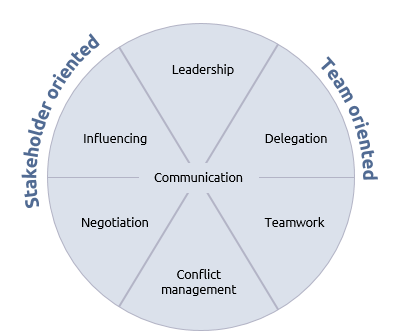When the complexities of human behaviour are sub-divided into distinct functions it can inevitably become somewhat artificial and theoretical. But P3 sponsors, managers and team members need to understand the mechanisms by which people relate to, and interact with, other people. Simple models such as the ones referenced in this section are a useful starting point for each individual as they build their own interpersonal skill-set.
The wheel below shows the seven interpersonal skills covered by Praxis. They can be loosely arranged into those that are primarily team oriented and those that are primarily stakeholder oriented.
 The wheel takes the P3 manager as its starting point, hence leadership appears at the top.
The wheel takes the P3 manager as its starting point, hence leadership appears at the top.
A manager needs to lead and motivate their management team and delivery teams. This will be through visionary leadership (ensuring people are committed to the objectives of the work) and managerial leadership (delegating work and developing teamwork).
The manager must also lead the stakeholder community, who do not collectively form a team and to whom delegation is rarely appropriate. When dealing with stakeholders, influencing and negotiation are more relevant. If the stakeholders are particularly senior or vital to the achievement of objectives, the P3 manager will inevitably call upon the support of the sponsor.
Whether delegating work to a team or influencing stakeholders, conflict will inevitably arise in some form. The manager will need to have conflict management skills no matter how well honed their other interpersonal skills may be.
Naturally, at the heart of all human interactions is communication.
If a manager can apply these skills with professionalism and within an ethical framework, they will engender trust and respect.
The fundamental principles of interpersonal skills do not vary across the range of projects, programmes and portfolios. However, the context and organisational structures do change and this leads to different challenges and different emphases in their application.





